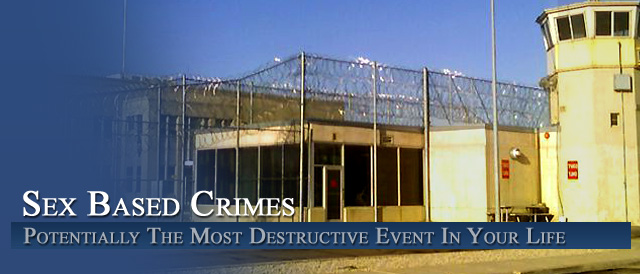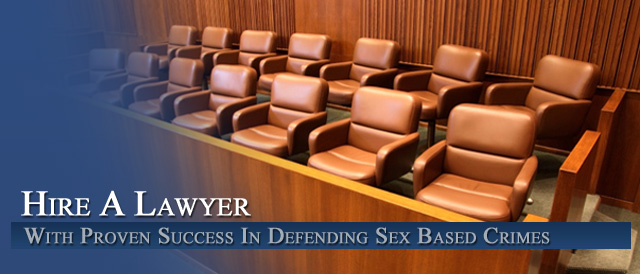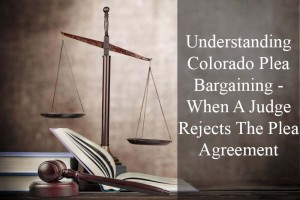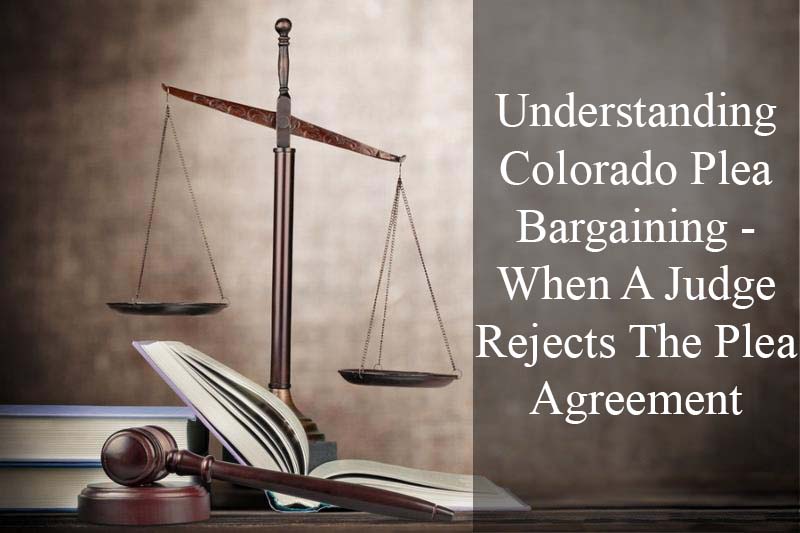




- Understanding Colorado Plea Bargaining – When A Judge Rejects The Plea Agreement
By H. Michael Steinberg Colorado Sex Crimes Criminal Defense Lawyer
 Understanding Colorado Plea Bargaining – When A Judge Rejects The Plea Agreement – It has been estimated that more than 95 to 98% of all criminal cases end in a plea bargain. For that reason alone it is important to know what can go wrong when a plea bargain is presented to a Trial Judge for his or her approval.
Understanding Colorado Plea Bargaining – When A Judge Rejects The Plea Agreement – It has been estimated that more than 95 to 98% of all criminal cases end in a plea bargain. For that reason alone it is important to know what can go wrong when a plea bargain is presented to a Trial Judge for his or her approval.
While rare, a Colorado Trial Judge CAN reject an agreement reached by the parties to a Colorado criminal case. The legal authority for this right to reject an agreement is found in Rule 11 of the Colorado Rules Of Criminal Procedure.
Rule 11 is the Rule that requires that all Defendant’s be advised of certain rights that must be expressly “waived” – that is given up – in exchange for their plea of guilty.
Colorado Judges make several “findings” at the time of the advisement. Among the most important of these findings is that the Defendant is knowingly and voluntarily relinquished the critically important constitutional rights outlined in the rule.
It is also important to note that a Judge CANNOT accept a guilty plea if the Defendant claims to be innocent.
Here is the Rule – Rule 11 – that applies to taking please – in its’ entirety:
Rule 11. Pleas
(a) Generally. A defendant personally or by counsel may plead guilty, not guilty, not guilty by reason of insanity (in which event a not guilty plea may also be entered), or with the consent of the court, nolo contendere.
(b) Pleas of Guilty and Nolo Contendere. The court shall not accept a plea of guilty or a plea of nolo contendere without first determining that the defendant has been advised of all the rights set forth in Rule 5(a)(2) and also determining:
(1) That the defendant understands the nature of the charge and the elements of the offense to which he is pleading and the effect of his plea;
(2) That the plea is voluntary on defendant’s part and is not the result of undue influence or coercion on the part of anyone;
(3) That he understands the right to trial by jury and that he waives his right to trial by jury on all issues;
(4) That he understands the possible penalty or penalties;
(5) That the defendant understands that the court will not be bound by any representations made to the defendant by anyone concerning the penalty to be imposed or the granting or the denial of probation, unless such representations are included in a formal plea agreement approved by the court and supported by the findings of the presentence report, if any;
(6) That there is a factual basis for the plea. If the plea is entered as a result of a plea agreement, the court shall explain to the defendant, and satisfy itself that the defendant understands, the basis for the plea agreement, and the defendant may then waive the establishment of a factual basis for the particular charge to which he pleads;
(7) That in class 1 felonies, or where the plea of guilty is to a lesser included offense, a written consent shall have been filed with the court by the district attorney.
(c) Misdemeanor Cases. In all misdemeanor cases except class 1, the court may accept, in the absence of the defendant, any plea entered in writing by the defendant or orally made by his counsel.
(d) Failure or Refusal to Plead. If a defendant refuses to plead, or if the court refuses to accept a plea of guilty, or a plea of nolo contendere, or if a corporation fails to appear, the court shall enter a plea of not guilty. If for any reason the arraignment here provided for has not been had, the case shall for all purposes be considered as one in which a plea of not guilty has been entered.
(e) Defense of Insanity.
(1) The defense of insanity must be pleaded at the time of arraignment, except that the court for good cause shown may permit such plea to be entered at any time before trial. It must be pleaded orally, either by the defendant or by his counsel, in the form, “not guilty by reason of insanity”. A defendant who does not thus plead not guilty by reason of insanity shall not be permitted to rely on insanity as a defense as to any accusation of any crime; provided, however, that evidence of mental condition may be offered in a proper case as bearing upon the capacity of the accused to form specific intent essential to the commission of a crime. The plea of not guilty by reason of insanity includes the plea of not guilty.
(2) If counsel for the defendant believes that a plea of not guilty by reason of insanity should be entered on behalf of the defendant, but the defendant refuses to permit the entry of such plea, counsel may so inform the court. The court shall then conduct such investigation as it deems proper, which may include the appointment of psychiatrists or psychologists to assist a psychiatrist to examine the defendant and advise the court. After its investigation the court shall conduct a hearing to determine whether the plea should be entered. If the court finds that the entry of a plea of not guilty by reason of insanity is necessary for a just determination of the charge against the defendant, it shall enter such plea on behalf of the defendant, and the plea so entered shall have the same effect as though it had been voluntarily entered by the defendant himself.
(3) If there has been no grand jury indictment or preliminary hearing prior to the entry of the plea of not guilty by reason of insanity, the court shall hold a preliminary hearing prior to the trial of the insanity issue. If probable cause is not established the case shall be dismissed, but the court may order the district attorney to institute civil commitment proceedings if it appears that the protection of the public or the accused requires it.
(f) Plea Discussions and Plea Agreements.
(1) Where it appears that the effective administration of criminal justice will thereby be served, the district attorney may engage in plea discussions for the purpose of reaching a plea agreement. He should engage in plea discussions or reach plea agreements with the defendant only through or in the presence of defense counsel except where the defendant is not eligible for or refuses appointment of counsel and has not retained counsel.
(2) The district attorney may agree to one of the following depending upon the circumstances of the individual case:
(I) To make or not to oppose favorable recommendations concerning the sentence to be imposed if the defendant enters a plea of guilty or nolo contendere;
(II) To seek or not to oppose the dismissal of an offense charged if the defendant enters a plea of guilty or nolo contendere to another offense reasonably related to the defendant’s conduct;
(III) To seek or not to oppose the dismissal of other charges or not to prosecute other potential charges against the defendant if the defendant enters a plea of guilty or nolo contendere.
(3) Defendants whose situations are similar should be afforded similar opportunities for plea agreement.
(4) The trial judge shall not participate in plea discussions.
(5) Notwithstanding the reaching of a plea agreement between the district attorney and defense counsel or defendant, the judge in every case should exercise an independent judgment in deciding whether to grant charge and sentence concessions.
(6) Except as to proceedings resulting from a plea of guilty or nolo contendere which is not withdrawn, the fact that the defendant or his defense counsel and the district attorney engaged in plea discussions or made a plea agreement shall not be received in evidence against or in favor of the defendant in any criminal or civil action or administrative proceeding.
Plea Bargaining 101
The basic forms of plea bargains fall into FIVE well known categories. Judges in the Denver Metro Area may – or may not – accept one or more of these types of plea bargains. It depends on the jurisdiction.
1. The Most Common Plea Bargain – Charge Plea Bargaining: In this type of plea bargain the DA agrees to lower the charge to something less serious. Such a plea bargain can also combine with a sentencing “stip” (stipulation) or some type of sentence “cap” on the sentence a judge may impose..which is a form of Number 3 – Sentencing Plea Bargaining.
2. Existing Counts Plea Bargaining: A variation of number 1 – charge bargaining – here the DA agrees to dismiss some or all of the remaining counts for a plea to one of the original counts. Again, there may be a sentencing agreement within this plea bargain.
3. Sentencing Plea Bargaining: Judges do not appreciate it when the parties control the sentence. Judge’s do not like to just “rubber stamp” the parties’ plea agreements. While many Colorado jurisdictions permit this type of agreement – many do not – such as Jefferson and Adams Counties. Most counties DO permit sentencing plea bargaining.
4. The Plea Agreement To “Fact Bargaining:” Here there is an negotiated agreement to agree to certain untruths to reach the plea agreement. The best example is when the parties agree that certain facts that “trigger” mandatory sentences – such as in drug “weight” cases – are artificially changed to reflect lesser amounts of the same drug – which in turn reduces the ultimate sentence under the law. Another example is treating a home burglary as a business or “building” burglary – thus changing a fact that results in a lower sentence.
5. Conditions Precedent – Plea Bargaining: When a DA and Defense lawyer agree to a plea bargain that requires a Defendant to perform certain conditions – such as testifying truthfully in another case or even the same case involving a Co-Defendant – the Judge retains jurisdiction until all of those conditions are satisfied. In the even the conditions are violated, a Colorado Judge can reject the plea and re-sentence the Defendant.
When A Judge Rejects A Colorado Plea Bargain – The How And Why
Judges almost always approve plea bargains. Anecdotally I would guess that they approve upwards of 98% of all plea agreements. However, there are times when a Judge will reject the parties’ plea agreement.
The decision to reject a plea agreement is usually based on the Judge’s opinion that the punishment does not “fit the crime.”
Some other factors that can influence a Judge are:
- The defendant’s prior criminal record.
- The facts of the case.
- The impact of the crime on the victim, and
- The impact of the crime on the general public.
In Colorado – Judge’s are very limited in terms of their involvement in plea bargaining. A Colorado Judge may either:
- accept the plea agreement
- reject the agreement
- defer the decision to accept or reject the plea agreement until sentencing and following a review of a pre-sentence report, (the pre-sentence investigative report – contains many things- including the Defendant’s prior criminal history, the facts of the case and a victim impact statement – and if, for example, there are serious criminal convictions on the record, this may cause the judge to reject the plea deal).
A Judge’s Thoughts On Rejecting Or Accepting A Plea Bargain
A controversial judge – who shall remain nameless – provides great insight in the following lengthy – but insightful quotation:
I believe that if my signature is required then so is my thoughtful deliberation. I did not take this job to be a rubber stamp. I always remember that the plea bargain has consequences for the persons standing in front of me, for the victim, for other potential victims and the entire community.
It is not the job of a judge to broker a deal between the DA and the defense. But it is the judge’s responsibility to decide if the deal is just and legal.
I have rejected many plea bargains. Some were not fair to the victim. Some were not fair to the community. And some were not fair to the accused.
I ask questions of the attorneys and the defendant before I accept plea bargains..
Most lawyers do their job and have no problem with the asking or the answering. I ask questions of the defendant to make sure they understand the legal consequences of the pleas and know and are voluntarily waiving their constitutional rights.
As a judge, I cannot go out and investigate a case. I have to rely on what the lawyers, the defendants and witnesses tell me in court.
I know that sometimes the DA must make deals he does not want to because of problems with evidence. Some young vulnerable victims cannot come into court and testify.
The DA is stuck between facing certain loss in court or getting a much lesser punishment than the case merits. I try to determine if such problems are the driving force of the plea bargain before deciding what I should do.
It would be arrogant of me or any judge to assume that we are never wrong. The only one who was never wrong did not sit on a bench but stood before one before being crucified.
What I can guarantee is that I will always do what I believe to be the right thing. I do not substitute anyone else’s judgment for my own.
Understanding Colorado Plea Bargaining – When A Judge Rejects The Plea Agreement
If you found any of the information I have provided on this web page article helpful please click my Plus+1 or the Share buttons for Twitter and Facebook below so that others may also find it.
The reader is admonished that Colorado criminal law, like criminal law in every state and at the Federal level, changes constantly. The article appearing above was accurate at the time it was drafted but it cannot account for changes occurring after it was uploaded.
If, after reading this article, you have questions about your case and would like to consider retaining our law firm, we invite you to contact us at the Steinberg Colorado Criminal Defense Law Firm – 303-627-7777.
Never stop fighting – never stop believing in yourself and your right to due process of law. You will not be alone in court, H. Michael at your side every step of the way – advocating for justice and the best possible result in your case.
 ABOUT THE AUTHOR: H. Michael Steinberg – Email The Author at h[email protected] – A Denver Colorado Criminal Defense Lawyer – or call his office at 303-627-7777 during business hours – or call his cell if you cannot wait and need his immediate assistance – 720-220-2277. Attorney H. Michael Steinberg is passionate about criminal defense. His extensive knowledge and experience of Colorado Criminal Law gives him the edge you need to properly handle your case.
ABOUT THE AUTHOR: H. Michael Steinberg – Email The Author at h[email protected] – A Denver Colorado Criminal Defense Lawyer – or call his office at 303-627-7777 during business hours – or call his cell if you cannot wait and need his immediate assistance – 720-220-2277. Attorney H. Michael Steinberg is passionate about criminal defense. His extensive knowledge and experience of Colorado Criminal Law gives him the edge you need to properly handle your case.
“A good criminal defense lawyer is someone who devotes themselves to their client’s case from beginning to end, always realizing that this case is the most important thing in that client’s life.”
You should be careful to make a responsible choice in selecting a Colorado Criminal Defense Lawyer – and we encourage you to “vet” our firm. Over the last 40 plus years – by focusing ONLY on Colorado criminal law – H. Michael has had the necessary time to commit to the task of constantly updating himself on nearly every area of criminal law, to include Colorado criminal law and procedure and trial and courtroom practice. H. Michael works hard to get his clients the best possible results in and out of the courtroom. He has written, and continues to write, extensively on Colorado criminal law and he hopes this article helps you in some small way – Understanding Colorado Plea Bargaining – When A Judge Rejects The Plea Agreement.

Other Articles of Interest:
- Should I Plea Bargain or Go To Trial?
- Colorado Sex Crimes Sentencing – The Dangers Of A Deferred Judgement To A Liftetime Sentence
- Colorado Criminal Law Series – Communication With Your Lawyer Is Essential – Plea Bargaining*
- Understanding How A Criminal Case Gets Resolved – Working With Your Colorado Criminal Defense Lawyer
- Can I Appeal My Sentence In Colorado? When And On What Grounds?












